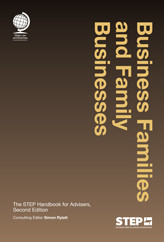
Why are business families important?
Family businesses are an essential part of the backbone of the UK economy. They produce more than 30% of the national gross domestic product and account for more than 40% of private sector employment, which equates to 9.5 million jobs. Sixty five percent of the 4.5 million private sector enterprises in the United Kingdom last year contributed £73 billion in taxes - 15% of the total tax revenue. Finally, family firms have a turnover of more than £1 trillion - over double that of the private equity sector - and employ more people than all the FTSE companies combined.
But it is also about more than just the numbers. Family businesses traditionally drive entrepreneurial activity, often provide local communities with employment and stability, and can look to the long term rather than focusing on short-term rewards.
How are business families different from other businesses?
This long-term approach is one of the major differences between a family business and any other sort of business. Without external shareholders demanding short-term return on investment, the family business can look to other rewards above and beyond the financial and take a longer-term view on financial returns. With a stronger long-term commitment from the owning family than is sometimes available from outside investors, those rewards can extend quite far down the line.
A further distinguishing feature is that the owners of the business are quite often easily identifiable. This means that the lines of communication between a family business and its owners can be drawn simply. With other types of business, communicating issues from the shop floor to the investors can take a more circuitous route.
However, unlike in non-family businesses, if there are problems, these are often rooted in relationship issues between family members and are less likely to relate to the commerciality of the business.
What issues should advisers be aware of when advising business families/family businesses?
There is a fundamental balancing act in advising on decisions that are right for the business and decisions that are right for the family. A decision which is purely good for the business, but fails to take into account the emotional influence of the family, can have disastrous results for the relationships involved. The reverse of this is also true: those decisions based solely on family concerns will probably not be in the best interests of the business.
It is a recurring theme of all family businesses: you can’t take the business family out of the family business.
In offering advice, it is imperative to understand the dynamics at play within the family; otherwise that advice will not be relevant, practicable or sometimes even acknowledged. Likewise, family businesses themselves need to be mindful of their own relationships and the impact these have on the business, and recognise when there are personal issues and deal with them appropriately.
Several issues are at the forefront of the family-owned concern. For example, what are the main concerns for the founder of the business, if he or she is still in control? Some of these concerns would involve minimising the estate for inheritance tax purposes, providing financially for the next generation without losing control and ensuring the future management of the business is safeguarded. In this situation, it is very important that advisers understand the different aspirations of the next generation.
A further issue to bear in mind is that historically, only one in eight businesses has continued to the third generation. This might be for a number of reasons, but the adviser can help to ensure that should this happen, it happens for the right reasons.
What would be your three top tips for advisers of business families?
The first thing for an adviser to do is to get an understanding of the relationships that are involved in the family business. When problems arise in a family business, they often result more from issues between family members than from actual business concerns. If you understand how the relationships work, you can provide tailored advice that will actually help.
Second, it is important that any family business is structured properly. This will be a key factor in determining success. The structure must support the varying objectives of the family members involved, while being designed to head off potential disputes in the future. This links back to that key understanding of the relationships involved. The structure must also be flexible enough to change with the constant movement in aspirations and needs of the family members, as the family grows and individual circumstances change. The structure of the family business is an area where an adviser can make a real difference.
With an understanding of the various relationships and with a strong structure in place, it is then possible to provide the framework for strong governance and management. All successful family businesses are well governed and well managed. Good management is the way in which the family business is run on a day-to-day basis and on a strategic level. The ideal is to integrate the governance and management systems and link them throughout the family business to ensure that both family and business operate successfully.
The most important point, though, is to know where the limits of your experience lie and where specialist advisers (sometimes family business specialists who often are not lawyers or accountants) can assist.
Where can advisers of business families/family businesses go for further support?
The first port of call should be one of the specialist business family advisers who, in my experience, are invaluable. There are also advisers at the Society of Trust and Estate Practitioners (STEP). They are there to help with local, national and international issues. STEP has a created the Business Families Special Interest Group, which focuses on providing the unique skills that are required in providing help and advice to family businesses. While specialist financial, accounting or legal advice is often needed, so to are the softer abilities of the counsellor or psychologist. This is where STEP can help: either through training or by putting you in touch with someone who can provide the skills that are needed.







